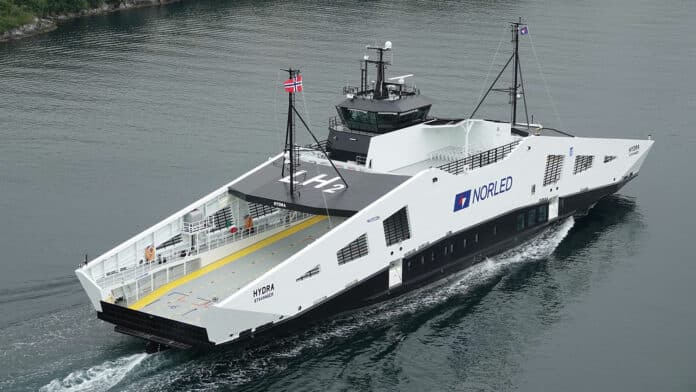The shipping industry is crucial for today’s global economy; however, the pressure it exerts on the environment is increasing rapidly. In order to reduce the emissions of harmful greenhouse gasses, the search is on for alternative fuels for the maritime shipping industry.
The use of hydrogen as a maritime fuel is one of the several approaches for zero-emission seagoing ships. So far, its applications include small cargo ships with modern sailing systems, catamarans, and even powerboats.
Now, a Norwegian shipping company Norled has put MF Hydra, the world’s first liquid hydrogen-powered ferry, into operations on 31st March. This marks a historic day, both for Norled and for Norway as a leading shipping nation, Norled’s CEO Heidi Wolden said.
Norled said it has been carrying out system tests at the quay in Hjelmeland since the beginning of the year. In recent weeks, the company has been running sea trials and received the final approvals from the Norwegian Maritime Authority (NMA). The MF Hydra is now all set to sail on the triangular route between Hjelmeland and Nesvik, says Erlend Hovland, Chief Technology Officer of Norled.
The 82.4 meters long MF Hydra, delivered in 2021, can carry up to 300 passengers and 80 cars. The ferry will be able to travel at speeds of 9 knots (10 mph) with two 200 kW fuel cells, a 1.36-1.5 MWh battery, and two 440 kW diesel generators that will power Shottel thrusters. The 80 cubic meter hydrogen tanks and the fuel cell are located on top of the ferry. It is expected to reduce its annual carbon emissions by up to 95%.
On this journey, Norled worked with a number of foreign partners. Linde Engineering in Germany has supplied the hydrogen systems on board, and Danish Ballard has developed the fuel cells that produce electricity from hydrogen. Westcon in Ølensvåg has been responsible for equipping and completing the vessel together with system integrator SEAM from Karmøy.
In addition, the automation scope for the hydrogen system was provided by Seam. Corvus Energy has supplied the batteries for the MF Hydra, and the vessel has been approved by Det Norske Veritas (DNV).
“We know that there may be challenges when it comes to putting new technology to use, and it is also good that the Norwegian Maritime Authority has been closely involved in the project from an early stage like we were when the first battery-operated car ferry was to be put into operation,” Director General of Shipping and Navigation Knut Arild Hareide said.
“This is, of course, a very important project for Norled, but also for Norway as a nation. The fact that we work together, businesses and authorities, to facilitate new technology development will give Norway a competitive advantage and may provide the basis for new jobs while also making it even more exciting to work in the maritime industry,” says Hareide.
